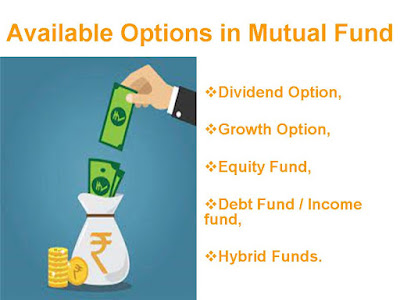Available Options in Mutual Fund
Dividend Option
The fund
normally earns income from the profit which it makes by investing in
securities. It also earns dividends on
those securities. The investors are
normally given the option of making some of the earnings through dividends by
Mutual Fund companies.
Growth Option
As said earlier,
a fund earns income from the profit it makes by investing in securities and
also in the form of dividends. In growth
option, the investors leave the earned profits in the mutual fund and allow it
to get invested for earning more returns.
A diversified portfolio of stocks normally has capital appreciation as
its primary goal. They invest in
companies that reinvest their earnings into expansion, acquisitions, and
research and development. Investors
generally get higher potential growth in these types of funds but there is
usually higher risk associated with them too.
Equity Fund
It is a mutual
fund that invests in a broad based and well-diversified group of stocks. The invested funds will either be in cash or
stock. Mostly an equity fund invests its
assets in stocks of companies and earns returns in the form of capital gains
(the difference between buying and selling stocks) as well as dividends earned
from these investments. This type of
fund is riskier than balanced funds and debt funds.
Debt Fund / Income fund
It is also
called bond fund as this fund normally invests in mainly government securities
and corporate bonds which bear interest.
It may invest in short-term or long-term bonds and other securitized
Products, money market instruments or floating rate debt. It earns returns from interest income on its
investments and profits on trading securities.
This fund is the least risky of all the funds. In other words, the main investing objectives
of a debt fund will usually be preservation of capital and generation of
income.
Hybrid Funds
This fund type
invests in equity shares of companies as well as debt securities. It earns income in the form of dividends and
interest as well as buying and selling securities. This is riskier than debt fund and less risky
than equity funds.
Some of distinctive characteristics of
mutual funds include the following :
- Investors purchase mutual fund shares from the fund
itself (or through a broker) instead of purchasing them from other
investors in a secondary market (in Stock Exchange).
- The mutual funds shares are purchased at per share
net asset value(NAV) of the fund.
Apart from that price an investor may have to pay any fees that the
fund imposes at the time of purchase in the form of specified entry loads.
- Mutual fund shares are “redeemable,” which means one
can sell one’s shares back to the fund or to a broker for the fund.
- Mostly Mutual funds are constantly creating and
selling new shares to attract and accommodate new investors.
Pros and Cons
Advantages
Every investment
has advantages an disadvantages. But
what is important to remember is that as the choices and preferences of each
investors vary, the advantage of a particular feature for him will depend on
his unique circumstances. Generally,
mutual funds provide quite an attractive investment choice for investors
because they generally offer the following features viz. Professional Management, Diversification
which mean spreading your investments across a wide range of companies and
industry sectors. Affordability in the
sense that one can enter in mutual funds even with relatively less invest able
amounts. Liquidity by way ready
availability or redemption of you shares at the extant NAV at any point of
time.
Disadvantages
But mutual funds
also have features that some investors might view as disadvantages, such as
costs, as investors pay sales charges, annual fees, and other ancillary charges
irrespective of the fund’s performance, even if it gives negative returns, lack
of control, as investors can neither determine the composition of a fund’s
portfolio nor can they directly influence the buying behavior of the fund
manager, price uncertainty as unlike with an individual stocks, with a mutual
fund, the purchase price or redemption price of the shares will depend on the
fund’s NAV.






